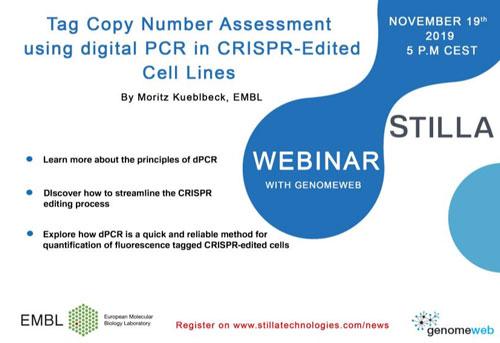

Stilla Technologies Digital PCR System
naica®Crystal Digital PCR System
NaicaTMCrystal Digital PCR System
Azure Biosystems Real-Time PCR Systems

On November 19(Paris time: 17:00), Moritz Kueblbeck, a researcher at the European molecular biology laboratory, will share online knowledge on "evaluation of labeled copy number using digital PCR in crispr-edited cell lines" on the Genomeweb platform.

Speaker’s Bio
Moritz Kueblbeck is a research technician at European Molecular Biology Laboratory. He worked for eight years as a research technician at the German Cancer Research Center (DKFZ) in Heidelberg. In 2014 he joined the lab of Jan Ellenberg at the European Molecular Biology Laboratory in Heidelberg where he performs human cell line genome editing to endogenously tag proteins (homozygous knock-ins of different tags in HeLa and U-2 OS cells) using CRISPR/Cas9 for different projects in the lab and collaborations.
Abstract
Fluorescent protein or self-labeling tags are invaluable tools for studying protein dynamics in living cells using fluorescence microscopy. However, quantitative imaging requires physiological levels of expression of the target protein of interest (POI), especially when stoichiometric interactions of the POI need to be investigated.
CRISPR has enabled researchers to tag virtually any target gene of interest, resulting in physiological levels of expression of the corresponding POI. However, the generation and selection of cellular clones bearing the correct edit – that is, the expected number of tagged alleles and an absence of extra integrations – requires quantitative assessment of the tag copy number.
This webinar will describe the use of dPCR as a quick method for quantification of green fluorescent protein copy number in CRISPR-edited HeLa cells. The discussion will also include an introduction to dPCR working principles and post-acquisition data analysis methods.
video
